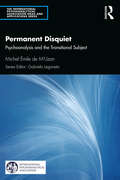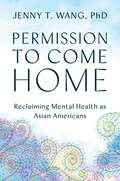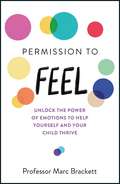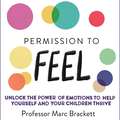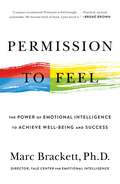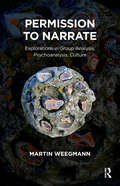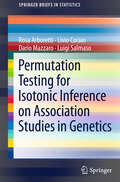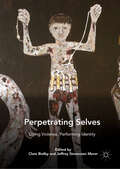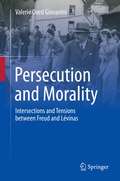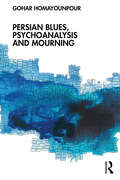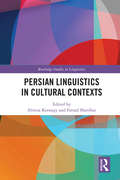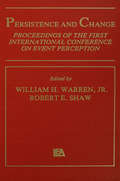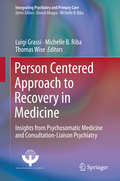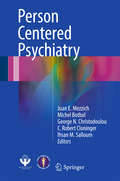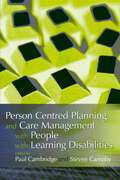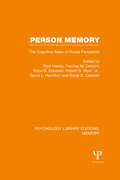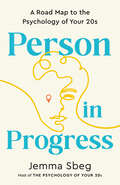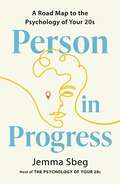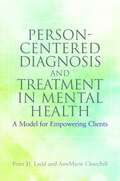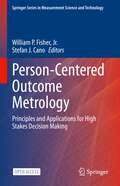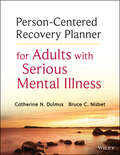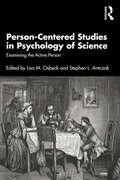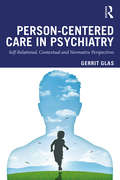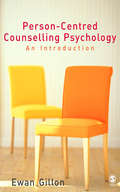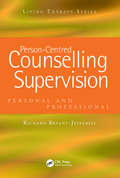- Table View
- List View
Permanent Disquiet: Psychoanalysis and the Transitional Subject (The International Psychoanalytical Association Psychoanalytic Ideas and Applications Series)
by Michel De M'UzanPermanent Disquiet: Psychoanalysis and the Transitional Subject comprises the first English language translation of some of Michel Émile de M’Uzan’s key writings, alongside an invaluable glossary by Murielle Gagnebin of M’Uzan’s work. Together, they give a thorough overview of his key thinking. <p><p>The first part of the book sees de M’Uzan exploring the compatibility between creativity (particularly creative writing) and psychoanalytic practice and includes an exchange with Jean-Bertrand Pontalis. The second part focuses on M’Uzan’s key psychoanalytic concept – "permanent disquiet". Freud stated that the purpose of psychoanalysis was to transform neurotic suffering into common unhappiness. De M’Uzan built on this idea in his career and examined what it means for the clinical process for the analyst to step back, not to try and force happiness onto the patient, but instead to accept and allow them to find for themselves their own state of ‘permanent disquiet’. Drawing on Freud and Winnicott and including an invaluable glossary of de M’Uzan’s own psychoanalytic terms, this book brings de M’Uzan’s powerful theory to the anglophone psychoanalytic world for the first time. <p><p>Permanent Disquiet: Psychoanalysis and the Transitional Subject will appeal to psychoanalysts and psychoanalytic psychotherapists globally who are interested in French psychoanalytic thought.
Permission to Come Home: Reclaiming Mental Health as Asian Americans
by Jenny Wang&“Dr. Jenny T. Wang has been an incredible resource for Asian mental health. I believe that her knowledge, presence, and activism for mental health in the Asian American/Immigrant community have been invaluable and groundbreaking. I am so very grateful that she exists.&”—Steven Yeun, actor, The Walking Dead and MinariAsian Americans are experiencing a racial reckoning regarding their identity, inspiring them to radically reconsider the cultural frameworks that enabled their assimilation into American culture. As Asian Americans investigate the personal and societal effects of longstanding cultural narratives suggesting they take up as little space as possible, their mental health becomes critically important. Yet despite the fact that over 18 million people of Asian descent live in the United States today — they are the racial group least likely to seek out mental health services. Permission to Come Home takes Asian Americans on an empowering journey toward reclaiming their mental health. Weaving her personal narrative as a Taiwanese American together with her insights as a clinician and evidence-based tools, Dr. Jenny T. Wang explores a range of life areas that call for attention, offering readers the permission to question, feel, rage, say no, take up space, choose, play, fail, and grieve. Above all, she offers permission to return closer to home, a place of acceptance, belonging, healing, and freedom. For Asian Americans and Diaspora, this book is a necessary road map for the journey to wholeness. .
Permission to Feel: Unlock the power of emotions to help yourself and your children thrive
by Marc BrackettA practical and transformative 5-step strategy to ensure the emotional wellbeing of yourself and your childThe mental wellbeing of children and adults is shockingly poor. Marc Brackett, author of Permission to Feel, knows why and what we can do. Marc Brackett is a professor in Yale University's Child Study Center and in his 25 years as an emotion scientist, he has developed a remarkably effective plan to improve the lives of children and adults - a blueprint for understanding our emotions and using them wisely so that they help, rather than hinder, our success and well-being. The core of his approach is a legacy from his childhood, from an astute uncle who gave him permission to feel. He was the first adult who managed to see Marc, listen to him, and recognise the suffering, bullying, and abuse he'd endured. In the decades since, Marc has led large research teams and raised tens of millions of dollars to investigate the roots of emotional wellbeing. His prescription for healthy children (and their parents, teachers, and schools) is a system called RULER, a high-impact and effective approach to understanding and mastering emotions that has already transformed the thousands of schools that have adopted it. RULER has been proven to reduce stress and burnout, improve school climate, and enhance academic achievement. This book is his way to share the strategies and skills with readers around the world. It is tested, and it works.
Permission to Feel: Unlock the power of emotions to help yourself and your children thrive
by Marc BrackettA practical and transformative 5-step strategy to ensure the emotional wellbeing of yourself and your childThe mental wellbeing of children and adults is shockingly poor. Marc Brackett, author of Permission to Feel, knows why and what we can do. Marc Brackett is a professor in Yale University's Child Study Center and in his 25 years as an emotion scientist, he has developed a remarkably effective plan to improve the lives of children and adults - a blueprint for understanding our emotions and using them wisely so that they help, rather than hinder, our success and well-being. The core of his approach is a legacy from his childhood, from an astute uncle who gave him permission to feel. He was the first adult who managed to see Marc, listen to him, and recognise the suffering, bullying, and abuse he'd endured. In the decades since, Marc has led large research teams and raised tens of millions of dollars to investigate the roots of emotional wellbeing. His prescription for healthy children (and their parents, teachers, and schools) is a system called RULER, a high-impact and effective approach to understanding and mastering emotions that has already transformed the thousands of schools that have adopted it. RULER has been proven to reduce stress and burnout, improve school climate, and enhance academic achievement. This book is his way to share the strategies and skills with readers around the world. It is tested, and it works.(P)2019 Macmillan Audio
Permission to Feel: Unlocking the Power of Emotions to Help Our Kids, Ourselves, and Our Society Thrive
by Marc BrackettThe mental well-being of children and adults is shockingly poor. Marc Brackett, author of Permission to Feel, knows why. And he knows what we can do. "We have a crisis on our hands, and its victims are our children."Marc Brackett is a professor in Yale University’s Child Study Center and founding director of the Yale Center for Emotional Intelligence. In his 25 years as an emotion scientist, he has developed a remarkably effective plan to improve the lives of children and adults – a blueprint for understanding our emotions and using them wisely so that they help, rather than hinder, our success and well-being. The core of his approach is a legacy from his childhood, from an astute uncle who gave him permission to feel. He was the first adult who managed to see Marc, listen to him, and recognize the suffering, bullying, and abuse he’d endured. And that was the beginning of Marc’s awareness that what he was going through was temporary. He wasn’t alone, he wasn’t stuck on a timeline, and he wasn’t “wrong” to feel scared, isolated, and angry. Now, best of all, he could do something about it.In the decades since, Marc has led large research teams and raised tens of millions of dollars to investigate the roots of emotional well-being. His prescription for healthy children (and their parents, teachers, and schools) is a system called RULER, a high-impact and fast-effect approach to understanding and mastering emotions that has already transformed the thousands of schools that have adopted it. RULER has been proven to reduce stress and burnout, improve school climate, and enhance academic achievement. This book is the culmination of Marc’s development of RULER and his way to share the strategies and skills with readers around the world. It is tested, and it works.This book combines rigor, science, passion and inspiration in equal parts. Too many children and adults are suffering; they are ashamed of their feelings and emotionally unskilled, but they don’t have to be. Marc Brackett’s life mission is to reverse this course, and this book can show you how.
Permission to Narrate: Explorations in Group Analysis, Psychoanalysis, Culture
by Martin WeegmannPermission to Narrate develops exciting new theory and explorations for group analysis. They are diverse in range and, from differing bases in theory and research, aim to cast light on how clients find voice and speak out in groups and the importance of rhetoric in the understanding of communication. It addresses the ways in which silenced, submerged and less confident voices emerge, finding permission and narration, often against the odds. Positioning and dialogical theory is used to show how such voices are caught up in and defined by discourses, and also how we can transcend the definitions and positions into which we are thrown. Accessible clinical and historical examples bring theory to life. Permission to Narrate also uses applied group analytic theory to consider the cultural role and rhetoric of monsters, and what these representations tell us about the position in which human beings conceive themselves. Also explored, using applied group theory, are the meetings of Alcoholics Anonymous and Quakers, both serving as remarkable examples of different, alternative group formations.
Permutation Testing for Isotonic Inference on Association Studies in Genetics
by Livio Corain Luigi Salmaso Rosa Arboretti Dario MazzaroThe purpose of this book is to illustrate a new statistical approach to test allelic association and genotype-specific effects in the genetic study of diseases. There are some parametric and non-parametric methods available for this purpose. We deal with population-based association studies, but comparisons with other methods will also be drawn, analysing the advantages and disadvantages of each one, particularly with regard to power properties with small sample sizes. In this framework we will work out some nonparametric statistical permutation tests and likelihood-based tests to perform case-control analyses to study allelic association between marker, disease-gene and environmental factors. Permutation tests, in particular, will be extended to multivariate and more complex studies, where we deal with several genes and several alleles together. Furthermore, we show simulations under different assumptions on the genetic model and analyse real data sets by simply studying one locus with the permutation test.
Perpetrating Selves: Doing Violence, Performing Identity
by Clare Bielby Jeffrey Stevenson MurerThis volume explores violent perpetration in diverse forms from an interdisciplinary and transnational perspective. From National Socialist perpetration in the museum, through post-terrorist life writing to embodied performances of perpetration in cosplay, the collection draws upon a series of historical and geographical case studies, seen through the lens of a variety of texts, with a particular focus on the locus of the museum as a technology of sense making. In addition to its authored chapters, the volume includes three contributed interviews which offer a practice-led perspective on the topic. Through its wide-ranging approach to violence, the volume draws attention to the contested and gendered nature of what is constructed as ‘perpetration’. With a focus on perpetrator subjectivity or the ‘perpetrator self’, it proposes that we approach perpetration as a form of ‘doing’; and a ‘doing’ that is bound up with the ‘doing’ of one’s gendered identity more broadly. The work will be of great interest to students and scholars working on violence and perpetration in the fields of History, Literary Studies, Area Studies, Women’s and Gender Studies, Museum Studies, Cultural Studies, International Relations and Political Science.
Persecution and Morality: Intersections and Tensions between Freud and Lévinas
by Valerie Oved GiovaniniThis book shows how persecution is a condition that binds each in an ethical obligation to the other. Persecution is functionally defined here as an impinging, affective relation that is not mediated by reason. It focuses on the works and personal lives of Emmanuel Lévinas—a phenomenological ethicist who understood persecution as an ontological condition for human existence—and Sigmund Freud, the inventor of psychoanalysis who proposed that a demanding superego is a persecuting psychological mechanism that enables one to sadistically enjoy moral injunctions.Scholarship on the work of Freud and Lévinas remains critical about their objectivity, but this book uses the phenomenological method to bracket this concern with objective truth and instead reconstruct their historical biographies to evaluate their hyperbolically opposing claims. By doing so, it is suggested that moral actions and relations of persecution in their personal lives illuminate the epistemic limits that they argued contribute to the psychological and ontological necessity of persecuting behaviors. Object relations and intersubjective approaches in psychoanalysis successfully incorporate meaningful elements from both of their theoretical works, which is used to develop an intentionality of search that is sensitive to an unknowable, relational, and existentially vulnerable ethical subjectivity.Details from Freud’s and Lévinas’ works and lives, on the proclivity to use persecution to achieve moral ends, provide significant ethical warnings, and the author uses them as a strategy for developing the reader’s intentionality of search, to reflect on when they may use persecuting means for moral ends.The interdisciplinary nature of this research monograph is intended for academics, scholars, and researchers who are interested in psychoanalysis, moral philosophy, and phenomenology. Comparisons between various psychoanalytic frameworks and Lévinas’ ethic will also interest scholars who work on the relation between psychoanalysis and The Other. Lévinas scholars will value the convergences between his ethics and Freud’s moral skepticism; likewise, readers will be interested in the extension of Lévinas’ intentionality of search. The book is useful for undergraduate or graduate courses on literary criticism and critical theories worldwide.
Persian Blues, Psychoanalysis, and Mourning
by Gohar HomayounpourIn Persian Blues, Psychoanalysis and Mourning, Gohar Homayounpour plays a theme and variations on loss, love, and family against the backdrop of Iran’s chaotic recent past. Homayounpour is simultaneously Shahrzad, the fearless storyteller, and Shahrzad’s analyst: subjecting fairy tales to fierce new insights, while weaving an indigo thread through her own devastation on the death of her father and the wonders and horrors of motherhood. A blue thread, or melody, runs though the separations and emigrations of her family and patients driven or broken apart by war, and likewise through the fraught world inhabited by Persian women. This book breaks new psychoanalytic ground, offering a radical rejection of traditional clichés about Iran, and Iranian women, but its unsparing elegance transcends any political agenda, bridging the ocean of a shared and tragic humanity. Persian Blues, Psychoanalysis and Mourning will be of great interest to psychoanalysts and psychoanalytically informed readers, as well as those interested in grief, Iran, and women’s experiences.
Persian Linguistics in Cultural Contexts (Routledge Studies in Linguistics)
by Alireza Korangy; Farzad SharifianKorangy and Sharifian’s groundbreaking book offers the first in-depth study into cultural linguistics for the Persian language. The book highlights a multitude of angles through which the intricacies of Persian and its many dialects and accents, wherever spoken, can be examined. Linguistics with cultural studies as its backdrop is not a new phenomenon, however with this text we are afforded an insight into the complex relationship that exists between human cognizance, and human expression in this ancient civilization. This study helps develop an innovative understanding of history, intent and meaning as understood by a culture and by a people, in this case the Persian-Speaking folk of Iran. The chapters are insightful resources for analyzing and augmenting our knowledge of linguistics under the rubric of Persian Culture but also for proposing and foregrounding new ideas in this field of study. This book will be of interest to researchers in linguistics, linguistic anthropology and psychology as well as scholars interested in Persian and Iranian studies.
Persistence and Change: Proceedings of the First International Conference on Event Perception
by William H. Warren Robert E. ShawFirst published in 1985. This series of volumes is dedicated to furthering the development of psychology as a branch of ecological science. In its broadest sense, ecology is a multidisciplinary approach to the study of living systems, their environments. and the reciprocity that has evolved between the two. The purpose of this series is to form a useful collection, a resource, for people who wish to learn about ecological psychology and for those who wish to contribute to its development. The series will include original research, collected papers, reports of conferences and symposia, theoretical monographs, technical handbooks, and works from the many disciplines relevant to ecological psychology. This volume holds proceedings papers.
Person Centered Approach to Recovery in Medicine
by Luigi Grassi Michelle B. Riba Thomas WiseThis book offers a resource to aid in implementing psychosocial screening, assessment, and consequently integrating prevention, care and treatment (i.e. pharmacological, psychosocial rehabilitation and psychotherapeutic) in medicine. It is becoming increasingly recognized that one method of combating spiraling health care costs in developed nations is to integrate psychiatric care into medicine including primary care settings. This volume reviews the main issues relative to the paradigm of a person-centered and recovery-oriented approach that should imbue all medical areas and specialties. It proposes integration methods in screening and assessment, clinimetric approach, dignity conserving care, cross-cultural and ethical aspects, treatment and training as a basic and mandatory need of a whole psychosomatic approach bridging the several specialties in medicine. As such, the book addresses a topic that all physicians, including primary care and psychiatric professionals in a wide variety of mental health settings are currently discussing, planning and preoccupied with, namely the task of integrating mental health into all the medical fields, including primary care, cardiology, psychiatry, oncology and so on.
Person Centered Psychiatry
by C. Robert Cloninger Juan E. Mezzich Michel Botbol George N. Christodoulou Ihsan M. SalloumThis book presents an authoritative overview of the emerging field of person-centered psychiatry. This perspective, articulating science and humanism, arose within the World Psychiatric Association and aims to shift the focus of psychiatry from organ and disease to the whole person within their individual context. It is part of a broader person-centered perspective in medicine that is being advanced by the International College of Person-Centered Medicine through the annual Geneva Conferences held since 2008 in collaboration with the World Medical Association, the World Health Organization, the International Council of Nurses, the International Federation of Social Workers, and the International Alliance of Patients' Organizations, among 30 other international health institutions. In this book, experts in the field cover all aspects of person-centered psychiatry, the conceptual keystones of which include ethical commitment; a holistic approach; a relationship focus; cultural sensitivity; individualized care; establishment of common ground among clinicians, patients, and families for joint diagnostic understanding and shared clinical decision-making; people-centered organization of services; and person-centered health education and research.
Person Centred Planning and Care Management with People with Learning Disabilities
by Jim Mansell Robina Shah Paul Cambridge Steven Carnaby'This excellent, informative and well presented, a book provides the reader with fourteen edited chapters covering an area of policy and practice that is quite specific but will inform anyone interested in the development of a service user participation ethos in adult social care. It is a book that is relevant to managers and practitioners, both as students and qualified professionals, as well as academics. Care management is now well established in the everyday practice of predominantly statutory organisations. This book revisits the principles of this method of assessing and planning the care needs of adult service users, and introduces Person Centred Planning (PCP) as a suitable method for ensuring that much of the empowerment rhetoric care management is actually realised.' - British Journal of Social Work 'Part of the attraction of this book is its strong practice component. This is applicable to the different professionals working with people with learning disabilities, in whatever their service configuration. For students, the book will also provide a good introduction to the impact of person centred planning and its connections to a long history of similar initiatives.' - Journal of Interprofessional Care 'This book is a stimulating and challenging read of those working in service development generally, as well as learning disability services. There is a potential broad care management readership that might also find this relevant and interesting.' - Journal of Interprofessional Care 'This is an important book. It brings together chapters by many of the foremost researchers and practitioners in person centred planning. The book contains many ideas for taking the PCP process to a higher level of sophistication to really underpin the future development of appropriate and effective services.' - Community Living 'This book will help social workers to reconnect with the core values of their profession and to challenge institutionalised policies and practices. It has proven to be a valuable teaching resource and whilst its focus is on people with learning disabilities, the principles of PCP that it raises are relevant to any service user group and social work arena. Highly recommended.' - Professional Social Work 'There are many important issues facing the care management system today in the light of person-centred planning and approaches, and you would be hard-pressed to find a better collection of insightful and radical thinkers in this area than those featured here. It asks hard questions, and challenges the professional to adopt more inclusive and accessible work practices. Wherever you work in the field of learning difficulties you should read this book carefully and aim to put "person-centeredness" at the core of your practice.' - Community Care 'You would be hard-pressed to find a better collection of insightful and radical thinkers in the area of care management. Wherever you work in the field of learning difficulties you should read this book carefully and seek to put "person centredness" at the core of your practice. The challenge for professionals, is making it a reality for individuals.' - Community Care This timely book provides a reflective analysis of person centred planning for people with learning disabilities, complementing policy initiatives that focus on individualised planning and service user involvement. Drawing on practical experience and research findings, the contributors explore policy and practice issues, including: * advocacy and empowerment * risk management and adult protection * inter-agency and inter-professional working * ethnicity and culture * de-institutionalisation. Vivid case studies illustrate best practice in person centred planning, and the authors offer a rich variety of ideas for increasing the participation, self-esteem and quality of life of people with learning disabilities. This practical and accessible text is an invaluable guide for policy makers, carers and social work managers, academics and students.
Person Memory: The Cognitive Basis of Social Perception (Psychology Library Editions: Memory)
by Reid Hastie Robert S. Wyer Thomas M. Ostrom Ebbe B. Ebbesen David L. Hamilton Donal E. CarlstonOriginally published in 1980, this title came about after many late night discussions between the authors during a 3-week workshop on Mathematical Approaches to Person Perception in 1974. In subsequent meetings a mutual interest emerged in the development of cognitive information processing metaphors for human thought and their application to problems of social perception, memory and judgment. Within the context of modern research on social cognition, the most distinctive aspects of the authors’ work was its empirical focus on how people cognitively represent people in memory, and its theoretical emphasis on models of cognitive organization and process. They concluded that an adequate theory of social memory was the necessary foundation for solutions to many questions concerning social perception and judgment that had dominated the 1974 workshop. This volume summarizes work conducted between 1974 and 1979 on social memory by these authors. In addition to six chapters summarizing individual research programs, the volume includes a general introduction and a concluding theoretical integration.
Person in Progress: A Road Map to the Psychology of Your 20s
by Jemma SbegA roadmap to navigating the personal and professional transitions of your twenties, with practical insights and reassurance that you&’re not alone, from the host of the top podcast The Psychology of Your 20s&“Like sharing a cup of tea with a very knowledgeable &‘near peer,&’ Person in Progress will help you feel better about your twenties.&”—Meg Jay, PhD, author of The Defining Decade and The Twentysomething TreatmentJemma Sbeg launched her wildly popular podcast, The Psychology of Your 20s, in the back seat of her car, driven (no pun intended) by the simple desire to understand the universal experiences of twentysomethings through psychological research. She&’s done the hard work and lived through these years, and now she shares advice, personal stories, and research-based insights to help you navigate this jungle of a decade, too. Whether you&’re wrestling with a sweaty case of imposter syndrome, doing your best not to self-sabotage, attempting to settle your anxious mind, or trying to keep your head above water in the murkiness of the dating pool, Sbeg will help you deal with the most chaotic personal and professional moments of this decade by understanding the psychology behind them. For example:• You have a multitude of choices about your career before you. Learn how to reframe the way you think about your future so that you don&’t get overwhelmed by the options. • Whether you&’re feeling the stigma of being single, stuck in a probably-going-nowhere situationship, or still hurting after heartbreak, discover how to understand and articulate what you&’re looking for in a relationship.• It&’s normal to make mistakes. Unpack how to get comfortable with your mistakes and let them teach you instead of ruminating on them.To enhance your own self-growth journey, the book includes questions and self-guided moments for your own reflection in each chapter. An invaluable guidebook to your twenties that will help you make the most of this formative decade, Person in Progress reminds us that it&’s okay to embrace uncertainty and transitions.
Person in Progress: A Roadmap to the Psychology of Your 20s
by Jemma SbegA roadmap to navigating the personal and professional transitions of your twenties, with practical insights and reassurance that you're not alone, from the host of the top podcast The Psychology of Your 20s.Jemma Sbeghen created her podcast The Psychology of Your 20s in the back of her car, driven by the simple desire to understand the universal experiences of her twenties through psychological research. Since then, the podcast's popularity has exploded, with millions of listeners eager for more of Jemma's advice, personal anecdotes from her early twenties, and research-based insights on popular topics like imposter syndrome, self-sabotage, the anxious mind, and the stigma of being single.Person in Progress is an expansion of her podcast work and a powerful, deep psychological dive into the messy transitions, life experiences, and major events of your twenties. With research and science from Jemma's background in psychology and neuroscience intertwined with her real-life stories, Person in Progress is a roadmap to navigating this time of your life, with reassurance that you're not alone in this chaotic transition period.Jemma shares advice on important topics that impact many twenty-somethings, including- Overcoming the paradox of choice by reframing how you think about your future- Investing in your most authentic self through internal validation- Navigating situationships and learning what you're looking for in a relationship- Building an intentional life outside of work and careerTo enhance your own self-growth journey, the book includes questions and self-guided moments for your own reflection in each chapter. An invaluable guidebook to your twenties that will help you make the most of this formative decade, Person in Progress reminds us that it's okay to embrace uncertainty and transitions.
Person-Centered Diagnosis and Treatment in Mental Health: A Model for Empowering Clients
by Peter Ladd AnnMarie ChurchillClients with mental health conditions are often diagnosed and treated using a strictly medical model of diagnosis, with little input from the client themselves. This reference manual takes a person-centered, holistic approach to diagnosis and treatment, seeing the client as the unrecognized expert on their condition and encouraging their collaboration. This qualitative approach aims to find meaning in the experiences of the client, exploring the reasons behind their feelings and behaviour and taking the whole person into account. Designed to complement DSM assessments, the manual covers several different conditions including ADHD, depression, bulimia, and OCD, as well as mental health 'patterns' such as abuse, bullying, violence and loss. In each case, the client is involved in the diagnosis and treatment plan. The book features extended case studies, sample questions and treatment plans throughout. This will be an essential reference book for all those involved in mental health diagnosis and treatment, including psychologists, psychiatrists, mental health counselors, clinical social workers, school counselors and therapists.
Person-Centered Outcome Metrology: Principles and Applications for High Stakes Decision Making (Springer Series in Measurement Science and Technology)
by William P. Fisher Jr. Stefan J. CanoThis unique collection of chapters from world experts on person-centered outcome (PCO) measures addresses the following critical questions: Can individual experiences be represented in measurements that do not reduce unique differences to meaningless uniformity? How person-centric are PCO measures? Are PCO measurements capable of delivering the kind of quality assured quantification required for high-stakes decision making? Are PCO measures likely to support improved health care delivery? Have pivotal clinical studies failed to deliver treatments for diseases because of shortcomings in the PCO measures used? Are these shortcomings primarily matters of precision and meaningfulness? Or is the lack of common languages for communicating outcomes also debilitating to quality improvement, research, and the health care economy? Three key issues form an urgent basis for further investigation. First, the numbers generated by PCO measures are increasingly used as the central dependent variables upon which high stakes decisions are made. The rising profile of PCO measures places new demands for higher quality information from scale and test construction, evaluation, selection, and interpretation. Second, PCO measurement science has well-established lessons to be learned from those who have built and established the science over many decades. Finally, the goal in making a PCO measurement is to inform outcome management. As such, it is vitally important that key stakeholders understand that, over the last half century, developments in psychometrics have refocused measurement on illuminating clinically important individual differences in the context of widely reproduced patterns of variation in health and functioning, comparable scale values for quality improvement, and practical explanatory models.This book’s audience includes anyone interested in person-centered care, including healthcare researchers and practitioners, policy makers, pharmaceutical industry representatives, clinicians, patient advocates, and metrologists.This is an open access book.
Person-Centered Recovery Planner for Adults with Serious Mental Illness
by Catherine N. Dulmus Bruce C. Nisbet"Both timely and critical for recovery-oriented practice, this book provides practitioners with the focused, essential knowledge and skills to be truly person-centered and recovery-oriented when supporting an individual's recovery journey. Dulmus and Nisbet have provided the field with an overdue practical resource. Making the recovery planner's best practice individual recovery plan format available on CD-ROM is brilliant, and every agency will want to incorporate it into its EMR." —Linda Rosenberg, President/CEO National Council for Community Behavioral Healthcare, Washington, D.C. "This is a practical and useful tool for case managers and community support workers who are assisting people with serious mental illness toward recovery. Working in a person-centered fashion is what our consumers want and expect, but to date, there have been few published tools with practical value for frontline staff. This resource is timely and relevant." —Michael F. Hogan, PhD, Hogan Health Solutions, Delmar, New York; former NYS Commissioner of Mental Health and Chair of the President's New Freedom Commission on Mental Health, 2002–2003 Proven guidance for creating effective person-centered plans that facilitate the recovery process for individuals with serious mental illness Recent national and international mental health policy is promoting service delivery models that incorporate person-centered and recovery-oriented approaches, in which individuals are in the lead role, defining their own goals for their individualized recovery plans. Person-Centered Recovery Planner for Adults with Serious Mental Illness provides mental health practitioners with a useful resource to implement person-centered planning within a recovery framework when working with individuals with a serious mental illness. Providing a succinct overview of the historical roots, philosophy, and practice of person-centered recovery, Person-Centered Recovery Planner for Adults with Serious Mental Illness is organized around the three stages of recovery—Beginnings, Moving Forward, and Leaving Your Practitioner Behind—yet still allows both the individual and practitioner to revisit any of the three stages during the ebb and flow of an individual's recovery journey. Sample recovery plans are included, covering the individual's status, personal priorities, short-term objectives, and recovery steps, and are organized around common recovery goals including: Self-advocacy Family relationships Health and wellness Community involvement Stress management Relapse prevention Personal crisis planning Transportation Social relationships Meaningful activities Life skills A companion CD-ROM provides all of the plans found in the book in an easily customizable word-processing format. Person-Centered Recovery Planner for Adults with Serious Mental Illness assists practitioners in becoming effective person-centered facilitators and advocates for recovery that meaningfully supports individuals in achieving their hopes and dreams.
Person-Centered Studies in Psychology of Science: Examining the Active Person
by Stephen L. Antczak Lisa M OsbeckThis unique collection examines "the acting person" as an important unit of analysis for science studies, using an integrative approach of in-depth case studies to explore the cognitive, social, cultural, and personal dimensions of a series of key figures in the sciences, from Goethe to Kepler to Rachel Carson. Opening up key questions about what science is, and what comprises a scientist, the volume offers an accessible introductory approach to psychology of science, a growing area in Science and Technology Studies (STS). Case studies focus on the psychological contexts of the contributions for which the scientist is known. Without diminishing its epistemic authority, science is presented as a psychologically saturated human activity, one that is especially illustrative of the way social, cognitive, and personal processes intermingle to both facilitate and impede scientific accomplishment. Each case study ends with a set of discussion questions, providing a valuable resource for student reflection and discussion, inviting analysis of similarities and differences in science in the context of very different lives and different projects. Person-Centered Studies in Psychology of Science is essential reading for scholars and graduates interested in the psychology of science, personality theory, social, or cognitive psychology, general psychologists, and theoretical psychologists.
Person-Centred Care in Psychiatry: Self-Relational, Contextual and Normative Perspectives
by Gerrit GlasOne of the paradoxes about psychiatry is that we have never known more about and better treated mental disorders, yet there exists so much unease about the practice of mental healthcare. Patients feel still stigmatized, psychiatrists are struggling with their roles in a rapidly changing system of healthcare, there is lack of consensus about what mental disorders are and what the focus of psychiatry should be. Person-Centred Care in Psychiatry: Self Relational, Contextual and Normative Perspectives offers a distinctive approach to two important linked conceptual issues in psychiatry: the relation between self, context, and psychopathology; and the intrinsic normativity of psychiatry as a practice. Divided in two parts, this book shows how the clinical conception of psychopathology and psychiatry as normative practice are intrinsically connected, and how the normative practice model can be conceived as a natural extension of the analysis of the web of relations that sustain illness behaviour as well as professional role fulfilment. Person-Centred Care in Psychiatry brings these topics together for the first time against the backdrop of unease about scientistic tendencies within psychiatry in an interconnected discussion that will be of interest to academics and professionals with an interest in the philosophy of psychology, psychiatry and mental health-care.
Person-Centred Counselling Psychology: An Introduction (Counselling And Psychotherapy Ser.)
by Dr Ewan Gillon'Not only is this the first key text on person-centred counselling psychology, but one of the best introductions to the approach. Gillon combines an in-depth understanding of the person-centred field with a highly accessible writing style to produce a book that will be of enormous value to anyone wanting to practice person-centred therapy. Essential reading for trainee and practising counselling psychologists with an interest in the person-centred approach and highly recommended for counsellors and psychotherapists of all orientations' - Mick Cooper, Professor of Counselling, Counselling Unit, University of Strathclyde Person-Centred Counselling Psychology: An Introduction is an introduction to the philosophy, theory and practice of the person-centred approach. Focusing on the psychological underpinnings of the approach, Ewan Gillon describes the theory of personality on which it is based and the nature of the therapeutic which is characterised by o unconditional positive regard o empathy o congruence. The book shows how the person-centred approach relates to others within counselling psychology and to contemporary practices in mental health generally. It also gives guidance to readers on the approach's research tradition as well as considering key issues for those wishing to train and work as a person-centred practitioner. As such, it is designed to be an applied, accessible text, providing a dialogue between the psychological basis of person-centred therapy and its application within the real world. As well as psychology students, it will be of interest to those from other disciplines, counselling trainees, those within the caring professions, and person-centred therapists from a non-psychological background. Ewan Gillon is Director of The Edinburgh Psychology Centre and Lecturer in Counselling Psychology at Glasgow Caledonian University.
Person-Centred Counselling Supervision: Personal and Professional (Living Therapies Series)
by Richard Bryant-JefferiesEach preceding book in the Living Therapy series provides a demonstration of the application of the person-centred approach to counselling and psychotherapy to clients presenting with particular issues. To complement these, this book focuses more on the supervisory element of the therapeutic process. It brings together examples of supervision sessions from the Living Therapy series, and presents each one as an example of person-centred supervisory practice of person-centred counselling. The supervision sessions deal with a range of issues that arise when working with clients who are seeking counselling in order to resolve difficulties from a wide range of difficult human experience. Each supervision session is introduced with a summary of the background, and points for discussion are included at the end of each chapter to stimulate further thought and debate. The book does not attempt to demonstrate a definitive way to apply person-centred principles to supervision, but does demonstrate core principles. It will prove valuable to experienced and novice supervisors, and to those uncertain about supervising counsellors working in areas outside their own professional experience. It should also be read by counsellors in training who are preparing to be supervised, for whom the book offers insights into this collaborative process.
